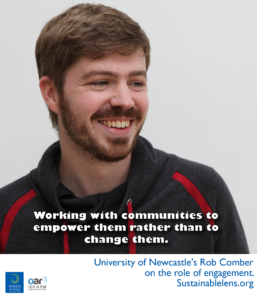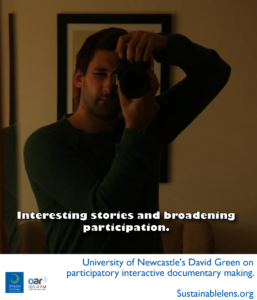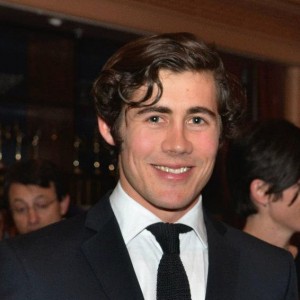
Working with communities to empower them rather than to change them.
Rob Comber is a a Lecturer in Computer Mediated Communication based at Newcastle University’s Open Lab. With training in psychology, Rob has worked on the role of online communities and now is focussed on food, activism, urban space, and sustainability – all through a lens of civic engagement.
Talking points
How people construct, create, and maintain relationships with each other through some of the mechanisms of pressing buttons and friending each other
How can you create a community when all you can really say is “I like this person†or “I like this thing that they’ve said�
“Do online communities have the same characteristics as real communities?†is where I started, but I found there’s no real difference between them – same values, people commit to them, spend time building relationships and doing things.
Online, digital, virtual isn’t replacing but augmenting what we are doing in our everyday lives.
Yes it is easier to press like…but you’ve done a lot of work to construct that community around you – so saying it is easier to press like is a bit like saying that if you are already a member of that club then it is easier for you to open the door and walk in.
So the idea that “slacktivism†is easy hides the work people have to do beforehand. It’s public too – you have to make a real commitment to say this is who I am. People can use that quite carefully to construct an image of themselves – this is the person who I am, and this statement is of value because I am making that commitment in front of other people
A challenge of looking at online communities is the romanticisation of offline communities.
Being exposed to poly-vocality, multiple voices and perspectives really enriches the way that we think about the world.
Why do we buy two to get one free, when we only need half?
Trying to find ways to connect communities together to improve the sharing of knowledge and expertise that they already have…inclusion and social sustainability.
Issues of resilience – looking at unrealised and under-realised capital that’s already there
We found a focus on behaviour change was quite useful if you wanted to stop someone from doing something, but very difficult to do if you wanted someone to try something new and to keep doing it.
Civic engagement: not saying “we know best we can tell you what to do and here’s how you can make your city betterâ€, instead it’s “we know you know how to make your city better, we want you to tell us so we can help you do itâ€.
Working with communities to empower them rather than to change them.
Realise that we don’t have that power to magically change a community, it’s much more beneficial to work together with them.
Role of a Civic University means the local community is not just the place where we are, but it is the place that we are.
We have to engage with the issues that arise here, partly because it is a disadvantaged area, but also because it is fundamental to what a university should be doing.
We have to be really able to demonstrate value and if we can show that it is intertwined and embedded in the lives of the people around the university then you don’t have to struggle to find why you are doing what you are doing, it comes from the people who are there already.
Water, energy and food nexus – trying to understand how these resources come together…how they are connected as systems.
How do you know if engagement is doing good? You get a sense of it, do the people I engage with see value in that engagement? Do they see outcomes they might have otherwise not anticipated? Unlike behaviour change work where we decide what we will change and therefore can evaluate it…but with engagement…what has changed for you?
We try to activate the activists. Find people who will take on that engagement and take on the role of saying “we need something more here, we need something better here†–whatever they decide. It’s being able to say that when we have to leave, that it becomes sustained by the community.
What a community should be…agonism…continually questioning the world around us.
We’re good at looking at ourselves and asking “is it good nowâ€, we’re not so good at asking “will we still be happy with this situation in 5, 10, 50 years?â€
A sense of questioning the status quo, but also questioning the future of that
Questioning across scales, but identifying other communities where you might be having an impact is a significant challenge even before you think about what that impact might be.
A sense of belonging is important, place tied to history, but we rarely think of a sense of belonging in terms of future generations.
In the same way that we look to previous generations for our sense of place, future generations belong to us in that way.
People think of technology as the future, so let’s use technology to represent the future back to us now.
Engagement: there’s no simple message of how to convince people to change behaviour, the point is that you’re not really convincing them, they have to convince themselves.
The long term element of engagement is a time scale of 3, 10 or 50 years – compared to nice results after a year or six months or a year for publishing “this is what we did it was amazingâ€.
We recognise the easy life, but if that was an amazing future then we wouldn’t need to be subversive.
The questioning itself is an important part – we need to take this critical stance in designing technology, even if the response is that we won’t design technology. This is different from a basis (of computing) of selling more new stuff
It is important to say can we sell less stuff? Can we even ask that question?
(Sustainable Superpower): People to be able to see connections between the things that they do – spatially, temporally, socially.
(Success): Being and to work in a research lab that values engagement and in ten years time we might be able to say that we did some good in hat engagement.
(Activist): I wouldn’t see myself as an activist. I wouldn’t see myself as the person who has the responsibility as the person in the community who knows and who knows which action is best. Academic research, when it’s well intentioned, when it’s working best through engagement is facilitative – is the aim of that to facilitate activism? I think so. Am I a facilitator? I hope so.
(Motivation): People. Above all else, taking a humanist perspective, and saying people are good, we need to work from that as a basic principle of what we are doing.
(Challenge): Engagement – being able to demonstrate that engagement is useful.
(Miracle): 100% turn out in every bit of local, national government – for people to wake up in the morning and really think about the society around them and something that they are involved and not to just take the easy life of sailing through it.
(Advice): Think about the world around you, and the people that are in it, and work with those people.
This conversation was recorded at Open Lab in Newcastle in September 2015.





